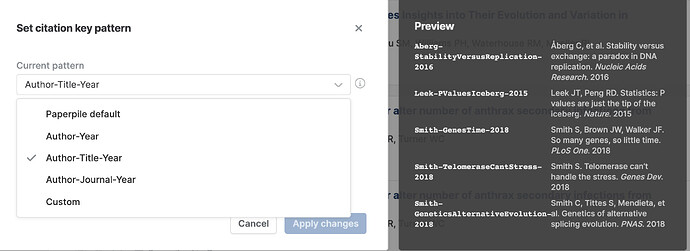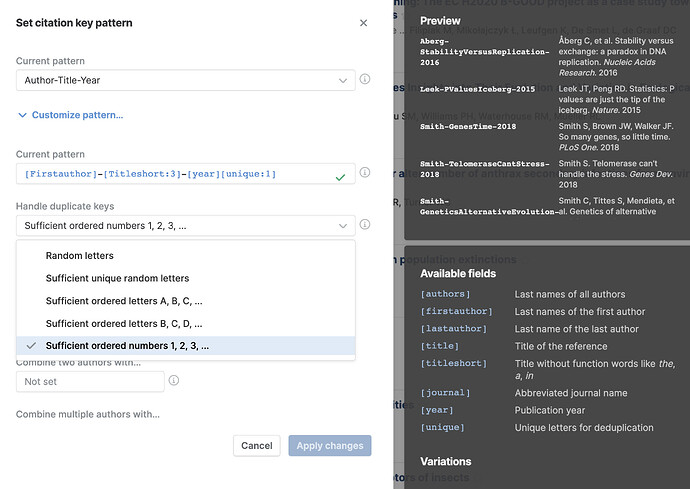Good day – I read the above; here’s what I did but it’s not working. Maybe I misunderstood. Working in Ulysses I copied citation keys (e.g., "Skinner1945-qt, Skinner1988-ka, Dvorsky2014-en, Sherman2010-bn) into a document. Then I opened the document in MS Word. I get the message that no Paperpile references could be found.
This workflow is something we wish to implement, but not yet a feature we offer. As stated by Stefan above…
…and by Jason in an earlier thread…
… this is still very much a goal we’re moving towards.
Why would one choose a nondeterministic algorithm for something as vital as citation keys?
When changing from Mendeley to Paperpile I now must edit each citation Key to fit the nondeterministic Algorithm (in an existing document).
It would be nice if one could choose the format per bibtex automatic export file.
Or if it were simply deterministic, e.g. Mendeley uses authorYYYYtitle.
Welcome to the forum @DanielHabenicht. We understand this is inconvenient for many, and so the ability to customize BibTeX keys is a feature that we plan to implement in the future. I’ve added your +1 to our internal feature tracker.
Please, Please, Please! Implement this feature. This is the only barrier to actually using paperpile for research.
You can get some inspiration from other apps (BibDesk is what I use before and it deals with citekye pretty well). I use authorYYYY as default and append a, b, c … to duplicate items.
Strong +1. Would be extremely good to be able to have something deterministic, and ideally configurable. When I see “authorYYYYtitle” I remember what the paper is. “authorYYYY-random letters” always makes me go “huh?”
If two users are trying to share the citation key for the same paper, will the two citation keys be identical? (I am not sure, but it seems like the answer is no.)
There are all sorts of predictable issues with a stochastic algorithm, if you imagine how your users will try to use citation keys. So, it is necessary to use a deterministic algorithm.
Something like authorYYYY-title would be great in a lot of cases, except titles can be very long and this might sometimes result in collisions if the first few words in a title are similar.
You might want to consider something like:
authorYYYY-x- where
xrepresents the first 2 characters of the md5sum of the title
Or use the md5sum of the DOI, for example. That way, you always get the same citation key for the same paper (even for different Paperpile users), and it will not collide with a different paper’s citation key.
Giving users the option to customize keys as they see fit would be ideal, especially if the configuration can allow two users to generate identical keys for the same paper.
Thanks for any updates on this issue!
Thanks for your question, @slowkow. First, it is now possible to set your own citation key pattern. In your library, go to Settings > General and click Set citation key pattern.
You can choose a predefined citation key pattern like “Author-Year” or “Author-Title-Year”:
Click Customize pattern to customize the pattern further or create a new pattern, for example with shortened titles (use the titleshort field).
You can also choose how to handle duplicate keys:
How are you trying to share the paper? In shared folders, the citation key pattern matches that selected by the owner of the shared folder. In shared libraries, citation key patterns follow the Paperpile default pattern.

